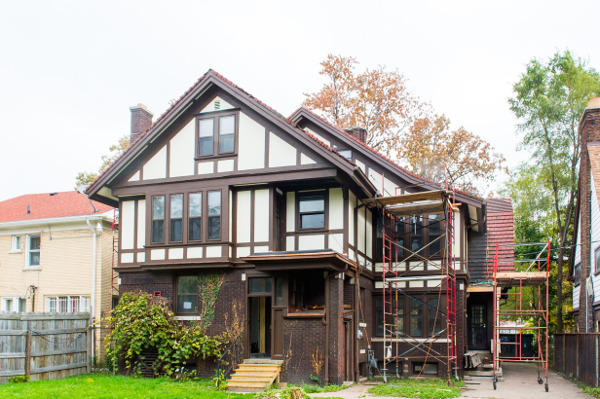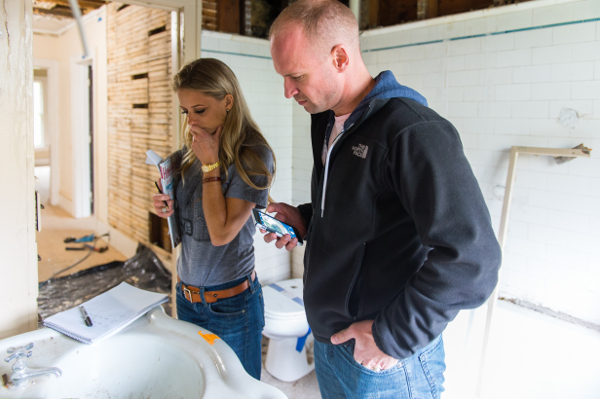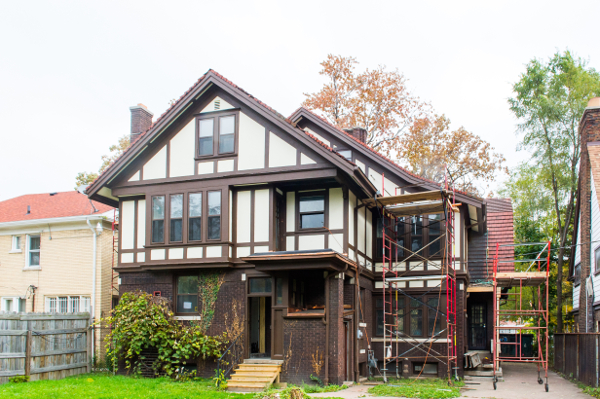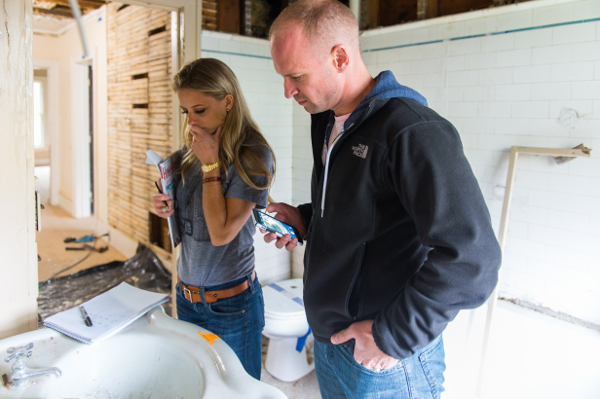Nicole Curtis, host of HGTV’s Rehab Addict, invests again in Detroit for new season
The sixth season of Rehab Addict premieres Jan. 8 and will feature Nicole Curtis's latest Detroit project, a house on East Grand Boulevard near Belle Isle on the city's east side.
Nicole Curtis, host of HGTV’s home renovation show Rehab Addict, has a challenge for her Michigan fans: Check out more of Detroit than just the inside of Comerica Park or Joe Louis Arena.
“My biggest mission is to get people into the city and out of the suburbs,” says Curtis, who grew up in metro Detroit. “There’s a lot of pride from people in the area who say they’re from Detroit but only go downtown a few times a year to see a Red Wings game. When people came to one of our open houses in Detroit they always say, ‘Oh, this isn’t so bad.’ I want to help break the stereotypes about Detroit.”
The sixth season of Rehab Addict premieres Jan. 8 and will feature Curtis’s latest Detroit project, a house on East Grand Boulevard near Belle Isle on the city’s east side.

The show follows Curtis as she buys and renovates houses that, to say the least, need a lot of love, to say the least. (In the fifth season of Rehab Addict, Curtis renovated a burnt-out duplex in Southwest Detroit. She still owns it by choice and prides herself on staying involved in the neighborhood.) Her focus is restoring homes on a realistic budget – she uses personal funds, not network money, to make renovations – while trying to stay true to their original architectural design.
“I try to be one step ahead when it comes to neighborhoods,” says Curtis. “Every hipster wants to live in Midtown, but I want people to be aware of the great historic neighborhoods that are in different places in the city. And that’s why we have a house in Southwest Detroit where people said, ‘Your house is going to be robbed or burned down.’ Well, it’s still there.”
Curtis’s latest Detroit project, a house purchased at auction from the Detroit Land Bank Authority, came in an unlikely manner. “I like to say that our house chose us,” she says. “I was in a meeting with Mayor Mike Duggan and I asked about the auctions. The great team at the Land Bank showed me how to bid on my phone on that day’s house and kind of dared me to bid. So I got into a bidding war with a guy who I later found out was a well-known investor who has been buying up these beauties and making them commercial buildings. And because our bidding was so close, we kind of had like a bidding overtime like in a sports game. So before the auction was even over I drove over to the house, pulled into the driveway and was like, oh no. It was in really bad shape. But at that same moment, I received notice saying I had won the auction.”
The home has been a challenge due to its size (three stories plus a basement) and neglect. But Curtis is excited about the project and its many great features, including a red clay tile roof. After a little research, they were stunned to find that the original maker of the roof tiles, the Ludowici Roof Tile Company, is still in business making terra cotta tiles in Ohio.
“It’s a fabulous house. It has red clay tile roof that most people would throw in the garbage, but we were able to track down the manufacturer of the tiles, who’ve actually been in business since before the house was built. And it’s really cool, we were able to get replacement tiles from the same company who originally made them back in 1910.”
Curtis gets a lot of emails from people who are keen on the idea of purchasing a $1,000 auction house in Detroit. She encourages people to be realistic about what it takes to rehab a house in this situation.
“If you want to buy a house in Detroit from the Land Bank, you either have to have time or money,” says Curtis. “You have no idea how many emails I get from people. Someone from Georgia who’s like, I just bought a house for $1,000 in Detroit, do you want to buy it? Like the old saying, if something seems too good to be true, it probably is. So you have to know what you’re getting into.”
Craig Fahle, director of public affairs at the Detroit Land Bank, says that having a home featured on television will provide a nice view of what’s possible.
“The best thing that comes from it is showing people the quality of Detroit’s housing stock and what’s possible when a house is fixed up correctly. And it’s great to see what a beautiful house looked like during its heyday. Another good thing about Nicole Curtis is that she actually goes through and shows the problems that can occur and everything that goes into fixing a house. That’s very helpful.”
Fahle says that while a lot of attention is placed on mansions and bigger homes from the Land Bank, the majority of homes sold are smaller, more manageable renovations.
“Her house is a big house and a huge project, and I think when people see what is possible with a project like that, perhaps they may be inspired to find that their smaller project isn’t so daunting,” says Fahle. “Typical Land Bank houses are smaller, 1,100-square-feet bungalows, not just big houses in Boston Edison that tend to get more attention.”

For Curtis, challenges include finding contractors who have the time and inclination to tackle a big project, though she is dedicated to utilizing local tradespeople. She says that people need to take into consideration that Detroit and the economy fluctuate and that it’s important to put in extra hours now when the work is available.
“Contractors say to me, ‘Well, I’m really busy right now, I’ve got enough work.’ Well, you weren’t saying that 10 years ago when you had no work and no money. I’m trying to drill into people’s heads, let’s not get lazy, because unless things become sustainable, it might not always be so busy. Just because there’s money now, doesn’t mean it’s always going to be like that.”
Still, Curtis says that the biggest difference between Detroit and other challenged big cities is that Detroit has hit rock bottom and its prospects can only get better. She hopes that her show will play a role in that revival as it shines a spotlight on some of Detroit’s great historic homes and neighborhoods and shows suburbanites that they don’t have to fear the city.
“I remember people used to think I was crazy when I’d ride my Vespa from Ferndale to the Detroit Yacht Club…So when they see a tiny little girl working in Detroit, and that I’m not afraid, I hope it gets people to change their way of thinking. I have the power to shame people a little.”
—
Season six of Rehab Addict premieres Jan. 8 at 8 p.m. EST on HGTV.
Nicole Curtis is currently planning an open house where the public can tour her completed Detroit project. She will announce the date in coming weeks on Twitter. Follow her @nicolecurtis.







